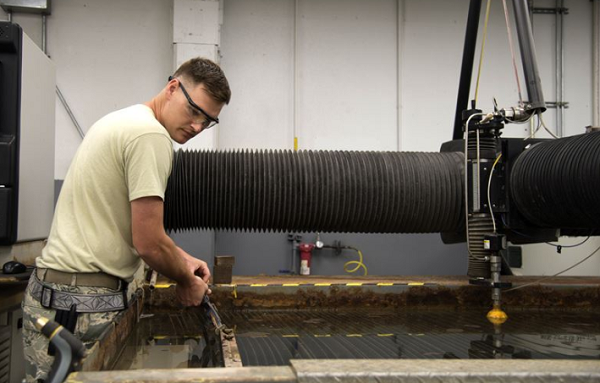Aircraft Metals Technology (2A7X1) specialist are the welders and fabricators of the Air Force.
They are responsible for repairing and creating essential aircraft parts.
These individuals advise, troubleshoot, repair, create and fit all aircraft parts to ensure the aircraft is in perfect working order.
Related Article – Air Force Jobs List: A List Of All AFSC’s In The Air Force
Education, Qualifications and Training
Air Force Aircraft Metals Technology specialist must meet the minimum qualifications.
This is an entry-level position in the Air Force, meaning no prior Military training or Officer training is required.
Education
A High School Diploma or GED is required.
Individuals must meet the minimum Mechanical requirements on the ASVAB test.
Qualifications
Minimum qualifications include:
- Must be at least 17 with parental consent or 18 without.
- Cannot be older than 39
- Must have normal depth perception
- Have knowledge of metal repair and fabrication process
Training
Recruits will attend Basic Military Training for 8.5 weeks.
After basic training they will attend technical training at Sheppard Air Force Base for 67 days.
Related Article: 41 Questions To Ask A Military Recruiter
Air Force Aircraft Metals Technology Job Duties
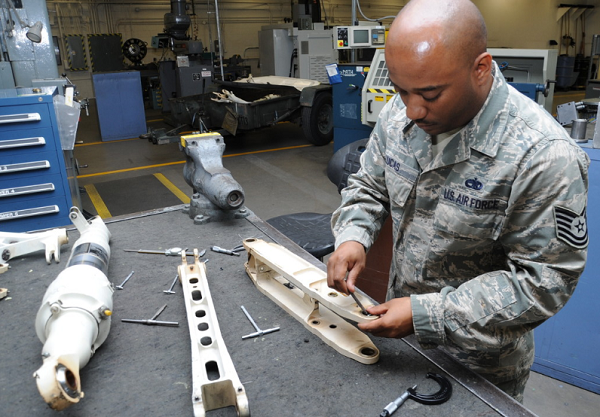
It is the job function of the Aircraft Metals Technology specialist to weld, fabricate and custom-make metal components that are critical to a functioning aircraft.
Administrative Functions
Although this a labor intensive position, there are administrative duties that surround it.
The administrative duties include drawing, working sketches, making templates, consulting shop drawings and selecting materials.
Individuals must also write programs for machines, including computer numerical controlled metal working machines, using the manual and computer-aided manufacturing methods.
Airmen will check all completed components and compare them with drawings and specifications to check serviceability and compliance.
They will advise other individuals and related parties on the metal machining, designing, welding and production problems for aerospace weapon systems and support equipment.
Equipment
Aircraft Metals Technology specialist work with a variety of different equipment types.
They are in charge of maintaining all equipment, machinery and tools.
They will inspect the equipment, machinery and tools then log the inspection and findings.
Any maintenance that is deemed required from the inspection will be completed by the specialist.
Any time maintenance on equipment is needed, the specialist will follow all lock out and tag out procedures to ensure safety is priority.
Running specialty equipment requires performing different metals technology shop calculations.
Calculations on equipment could include determining cutting speeds/settings, preheat/post-heat requirements and welding processes.
Basic Functions
Aircraft Metals Technology specialist are in charge of precision tool, component and assemblies being designed, welded, heat treated and machined.
To assist with their repair and metalworking operations, individuals will design, manufacture or modify special precision tools, fixtures and gauges.
They will weld, heat treat and solder metals.
Specialist will repair slots, cams, gears and keyways for aircraft components using both manual methods and computer numerical controlled metal working machines.
They will measure broken or worn parts using calibers, gauges and micrometers.
Specialist use precision grinding to remove any corrosive or poisonous deposits.
Aircraft Metals Technology specialist use precision measuring devices to check components for wear tolerance.
Any component parts that need replacing will be dissembled, repaired, fitted and re-assembled using machine screws, rivets, bolts and welding.
Airmen will then ensure all surface finishing specifications are met for all existing and repaired components.
Specialist follow all environmental standards to use and dispose of hazardous waste and materials.
What is the pay like for an Aircraft Metals Technology Specialist?
All airmen are paid the same based on rank and years of service.
Rank will be based on the education and experience you have.
You can use the table below to get a general idea of what the base pay is like in the Air Force.
| Insignia | Pay Grade | Rank | Abbreviation | 2023 Minimum Monthly Pay |
|---|---|---|---|---|
| E-1 +4 months | Airman Basic | AB | $1,917.60 | |
| E-2 | Airman | Amn | $2,149.20 | |
| E-3 | Airman First Class | A1C | $2,259.90 | |
| E-4 | Senior Airman | SrA | $2,503.50 | |
| E-5 | Staff Sergeant | SSgt | $2,730.30 | |
| E-6 | Technical Sergeant | TSgt | $2,980.50 | |
| E-7 | Master Sergeant | MSgt | $3,445.80 | |
| E-8 | Senior Master Sergeant | SMSgt | $4,957.20 | |
| E-9 | Chief Master Sergeant | CMSgt | $6,055.50 | |
| E-9 | Command Chief Master Sergeant | CCM | $6,055.50 | |
| E-9 | Chief Master Sergeant Of The Air Force | CMSAF | $6,055.50 |
Related Article – Air Force Flight Engineer (1A1X1): Career Details
Benefits
All individuals, regardless of rank or position have access to benefits.
The benefits that are offered include:
- Insurance: Free/low cost medical and dental; paid sick time; low cost life insurance
- Housing: Allowance that varies depending on if you live on or off base.
- Food: Monthly allowance in addition to access to tax-free department and grocery stores
- Retirement: Generous plan offered after 20 years of service
- Vacation: 30 days of paid vacation
- Education: Up to 100% off tuition with the Air Force Tuition Assistance program, the Post 9/11 GI Bill and the Montgomery Bill
- Recreation: On-base recreational facilities, social events and youth activities
Job Reviews
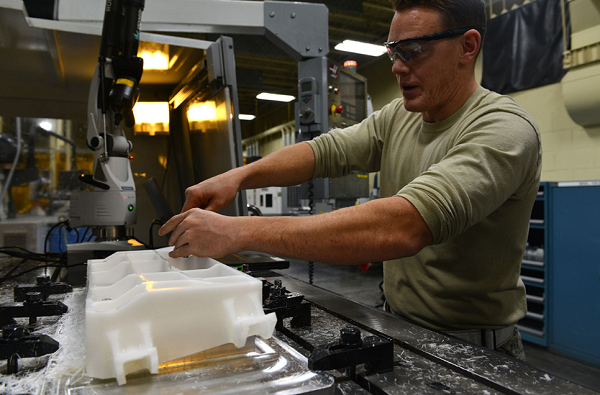
This position is fast-paced and requires skill.
People who have previously held the position recommend it for the valuable skills you learn.
Positive job reviews include referring to great benefits, being paid to travel and clear expectations on your position.
Negative job reviews discuss the amount of rules/regulations, and the hours making it difficult to balance work and home life.
You can find a few reviews from people who have been in the specialist position below.
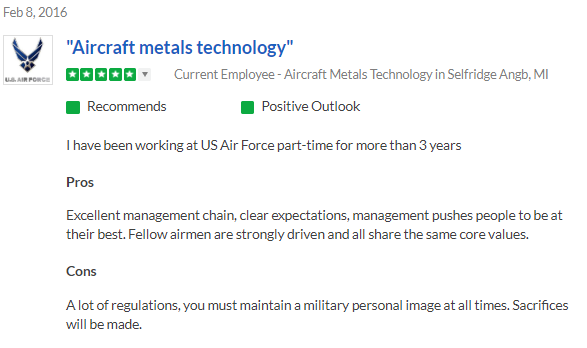
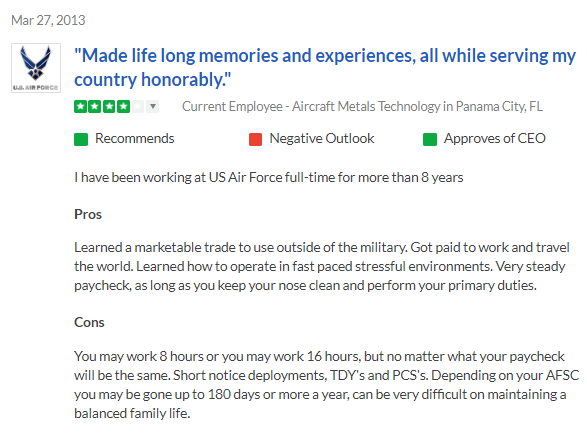
Civilian Job Opportunities
Aircraft Metals Technology positions allow individuals to gain experience in welding, repair and fabrication that can be used in civilian positions.
These specialist are more than just general maintenance technicians.
They have skill sets and discipline that would make them a valuable asset to any civilian employer.
Civilian Positions that relate to Aircraft Metals Technology specialist include:
- Welding Engineer
- Aircraft Welder
- Precision, FAB and tooling
- Mechanical Assembler
- Tooling Fabricator
- Aircraft Mechanic
- Machinist
They pay for these positions will be based on the company that you work for and the level of the position.
Related Article – Air Force Airborne Mission Systems Operator (1A3X1): Career Details
Summary
Air Force Aircraft Metals Technology specialist are responsible for troubleshooting, repairing, creating and fitting aircraft metal components.
These individuals have varying responsibilities and tasks surrounding welding and fabricating aircraft parts.
Specialist will write programs, maintain equipment and create custom pieces.
This is an entry-level position and those looking to pursue this job field should expect to be paid base amounts with benefits.
Most reviews from individuals in this position are happy they chose it.
They recommend it for the benefits and knowledge gained.
Negative reviews discuss the inability to create a family/work balance.
There are many civilian positions related to aircraft welding and fabrication that vary on pay and location.
Reference:
Air Force Aircraft Metals Technology
- 5 Worst Jobs in the Air Force - June 20, 2024
- 4 Steps For Visiting An Air Force Recruiter Near You - June 19, 2024
- Air Force Safety Specialist (1S0X1) - June 19, 2024
Originally posted on September 12, 2019 @ 4:59 am
Affiliate Disclosure: This post may contain affiliate links. If you click and purchase, I may receive a small commission at no extra cost to you. I only recommend products I have personally vetted. Learn more.
